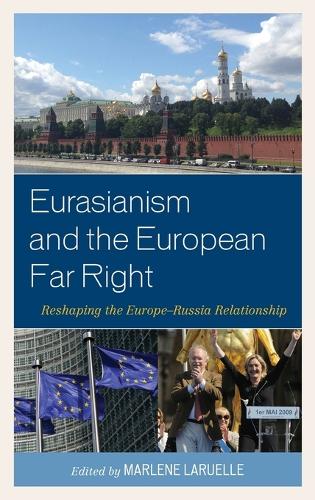
Eurasianism and the European Far Right: Reshaping the EuropeRussia Relationship
(Hardback)
Available Formats
Publishing Details
Eurasianism and the European Far Right: Reshaping the EuropeRussia Relationship
By (Author) Marlene Laruelle
Contributions by Emel Akali
Contributions by Jean-Yves Camus
Contributions by Vgar Imanbeyli
Contributions by Umut Korkut
Contributions by Marlene Laruelle
Contributions by Vadim Rossman
Contributions by Giovanni Savino
Contributions by Anton Shekhovtsov
Contributions by David C. Speedie
Bloomsbury Publishing PLC
Lexington Books
1st July 2015
United States
Classifications
Professional and Scholarly
Non Fiction
Political ideologies and movements
Political economy
European history
Geopolitics
Diplomacy
327.4047
Physical Properties
Hardback
292
Width 162mm, Height 236mm, Spine 25mm
553g
Description
The 2014 Ukrainian crisis has highlighted the pro-Russia stances of some European countries, such as Hungary and Greece, and of some European parties, mostly on the far-right of the political spectrum. They see themselves as victims of the EU technocracy and liberal moral values, and look for new allies to denounce the current mainstream and its austerity measures. These groups found new and unexpected allies in Russia. As seen from the Kremlin, those who denounce Brussels and its submission to U.S. interests are potential allies of a newly re-assertive Russia that sees itself as the torchbearer of conservative values. Predating the Kremlins networks, the European connections of Alexander Dugin, the fascist geopolitician and proponent of neo-Eurasianism, paved the way for a new pan-European illiberal ideology based on an updated reinterpretation of fascism. Although Dugin and the European far-right belong to the same ideological world and can be seen as two sides of the same coin, the alliance between Putins regime and the European far-right is more a marriage of convenience than one of true love. This unique book examines the European far-rights connections with Russia and untangles this puzzle by tracing the ideological origins and individual paths that have materialized in this permanent dialogue between Russia and Europe.
Reviews
This is a timely and topical collection of research. . . .[The articles] provide the reader with an interesting snapshot of the current political relationships between the Russian state, Eurasianist proponents, and specific far right circles. . . .The shifting of international politics into a distinctively multi-polar phase guarantees the ongoing importance of Russia as an international actor and we need to keep developing our analysis of its behaviour. This includes being aware of weak critiques of it as either a fascist, or anti-imperialist state. This book is useful in delving into this through an oblique angle, its relationship with its own indigenous far right movements. * Actually Existing Barbarism *
Against this sad background, the appearance of this volume, edited by Marlene Laruelle, perhaps the worlds foremost researcher of neo- and classical Eurasianism, is highly welcomed. Laruelles essay collection is especially valuable as it combines a wide range of specific topics with particularly rich descriptive case analyses. . . .This volumes collection compiled by Laruelle fills a whole number of gaps in the mosaic of Russias increasing integration into transnational extreme-right-wing networks. These well-researched papers providesufficient starting points for more directed research into specific episodes in neo-Eurasianisms relationship to the countries covered here. . . .Laruelle and her authors are to be congratulated for having, with this outstanding volume, given a crucial impulse to the emergence of a new sub-discipline of Russian nationalism studies that could be labelled neo-Eurasianism studies. * Slavic Review *
Many of [the books] chapters provide a good overview of Far Right developments in European countries. As a case in point, Vgar manbeylis analysis of Turkish debatesis excellent in showing the facets of Turkish Eurasianism as this ideology has appeared in recent decades. Similarly, Sofie Tipaldou provides a helpful, thorough presentation of how the Greek Golden Dawn has built on its neo-Nazi roots to acquire increased public presence. * Journal of Soviet and Post-Soviet Politics and Society *
Marlene Laruelle has assembled an impressive team of authors, who show that Alexander Dugins Eurasianism is best understood as an offshoot of the European Far Right, and not a product of Russias distinctive cultural heritage. This makes for an interesting contribution to the far reaches of the history of European political thought. -- Peter Rutland, Wesleyan University
This collection contributes significantly to the burgeoning international field of comparative fascism studies, while also allowing some of the inner metapolitical logic of Putin's foreign policy to become transparent and intelligible. An important book which should be read by all those who claim to be experts on the machinations of contemporary Russia, and which finally puts some substance into vapid discussions of its 'fascism'. -- Roger Griffin, Oxford Brookes University
This well-designed volume fills a crucial gap in our understanding of the ideological (and sometimes personal) ties connecting Eurasianist philosophers in Russia (especially the infamous Alexander Dugin) with surging anti-immigrant and far-right ultranationalist political parties in Europe and Turkey. Marlene Laruelle assembles an international cast of experts to examine these questions with depth and nuance, focusing on implications for Putins Kremlin and the evolving international order. A boon for scholars, this work will also serve as a reference for journalists and other analysts trying to understand the complexities of the Russian-European relationship today. -- Kimberly Marten, Barnard College, Columbia University
Author Bio
Marlene Laruelle is associate director at the Institute for European, Russian, and Eurasian Studies (IERES) and research professor of international affairs at George Washington University.
